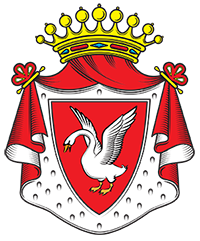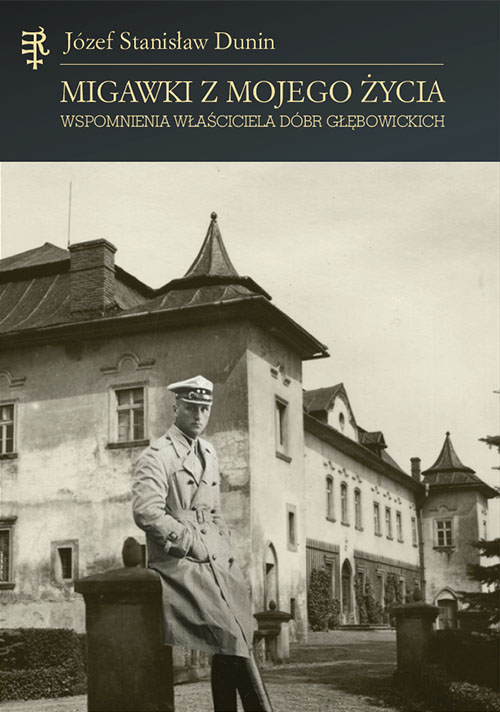JÓZEF LUDWIK STANISŁAW OF SKRZYNNO DUNIN FROM GŁĘBOWICE, OF THE SWAN COAT OF ARMS
Józef Stanisław Dunin was the last pre-war owner and manager of the Głębowice estate. He was also the last of Dunins for whom the palace was home. A lost home that he never managed to reclaim, only watching from a distance over the years as it sadly deteriorated. He did not live to see the estate return to the family's hands, as this occurred only 40 years after his death...
Józef Stanisław is the author of Millennium Duninorum Comitum Skrzinnensium, a multi-volume work that is a priceless source of information and a collection of facts and memories about the Dunin family, from its earliest representatives to the end of the author's life. The author meticulously gathered and recorded knowledge about the Swans, supported by documents, enriched with photographs, and complemented by additional thematic sections, such as Glimpses and Letters or Biographical Dictionary - Dunins.
These works were invaluable in preparing materials for the Foundation's website and a treasure trove of knowledge about the family, knowledge that would be sought in vain even in the most detailed historical or genealogical texts dedicated to the Dunin family.
Józef Stanisław (1896-1980), the second son of Stanisław Dunin of Skrzynno, bearing Swan coat of arms and Maria of the Ursyn-Pruszyński family, bearing Rawicz coat of arms, was born in Głębowice on June 9, 1896.
He had six siblings: Felicja (1889-1890), who passed away in infancy, Albina (1890-1972), who married Izasław Sroczyński of the Nowina coat of arms, Tytus (1892-1939), the owner of Gierałtowiczki, who married Maria countess Romer of the Jelita coat of arms, Olga (1893-1959), who married Stanisław Dzierżykraj-Morawski of the Drogosław (Nałęcz) coat of arms, Ludwik (1898-1949), co-owner of Kopytówka, and Piotr Jerzy (1901-1942), also co-owner of Kopytówka, married to Honorata Skibniewska of the Ślepowron coat of arms, who tragically perished in an aviation accident during a training flight in Dunino, Scotland.
World War I
In 1914, Józef Stanisław graduated from the III Gymnasium in Kraków, passed his final exams, and enrolled in the Faculty of Law at the Jagiellonian University. In August of the same year, he and his brother Ludwik joined the forming Polish Legions. Initially, they joined the 1st squadron organized under Lieutenant Kawy's command, then the 2nd squadron under Lieutenant Zbigniew Dunin-Wąsowicz. After a few weeks due to health reasons, the brothers returned home, and in the autumn, Józef Stanisław began studying at the Hochschule für Bodenkultur in Vienna.

Legions, August 1914, the 1st cavalry squadron marches to the Błonia. In the first row, second from the right, marches 16-year-old Ludwik Dunin, and in the fourth row, first from the right, is Józef Stanisław Dunin. In 1939, two Germans from Zator disguised themselves in the uniforms of the Dunin brothers located in Głębowice, which incriminated them during the trial.
On April 15, 1915, Józef Stanisław was conscripted into the Austro-Hungarian army and sent to the artillery officer school in Zirc, Hungary. In February 1916, he was deployed to the Eastern Front. During the Brusilov Offensive near Sopanow, he was wounded and hospitalized. After recovering, he returned to Kraków with decorations, joining the Cavalry Artillery Cadre and rising to the rank of ensign. From Kraków, he was assigned to Litoměřice to join the forming Field Artillery Regiment. As a lieutenant, he returned to the front. After eighteen months on the Eastern Front and later in Italy, in October 1918, he served as an adjutant to General Ignacy Ledóchowski in the Heavy Artillery Squadron. In 1919, he was confirmed as a lieutenant and granted a three-month leave from the military to continue his studies.
He did not return to his regiment after the leave due to the dissolution of the Austro-Hungarian monarchy. In 1920, he volunteered for service and was assigned to the 1st Cavalry Artillery Squadron in Góra Kalwaria, where he served as the commander of a training battery and the deputy commander of the cadre.

Józef Stanisław Dunin as the commander of a training battery in the 1st Cavalry Artillery Squadron, Góra Kalwaria 1920.
The interwar period
According to the late father's will, Józef Stanisław inherited the Głębowice estate. Shortly after the expiration of a long-term lease agreement, around 1920, the young heir began managing the estate, a responsibility he continued uninterrupted until the outbreak of the war in 1939.
On his own initiative, he carried out a thorough renovation and modernization of the palace, renovated the interiors, and recreated the eighteenth-century Italian geometric garden. In the interwar period, the Głębowice palace was considered one of the most splendid rural residences in the Kraków region, and in 1937, it was recognized as a first-class historic landmark.
Thanks to his great skills and, as he himself claimed, a rather fortunate hand, he relatively quickly transformed the farm, which had been neglected by tenants, into a thriving state. He modernized and intensified agricultural production, significantly increasing the profitability of the estate. During his tenure, Głębowice flourished as a modern production-agricultural-industrial farm.
As an avid hunter, he organized hunting grounds to improve the game population on his own and leased lands. He organized famous hunts known throughout the region and founded the Podkarpacki Equestrian Hunting Club to promote horse breeding and equestrian sports.
He also actively participated in community life and was heavily involved in local community affairs and initiatives.
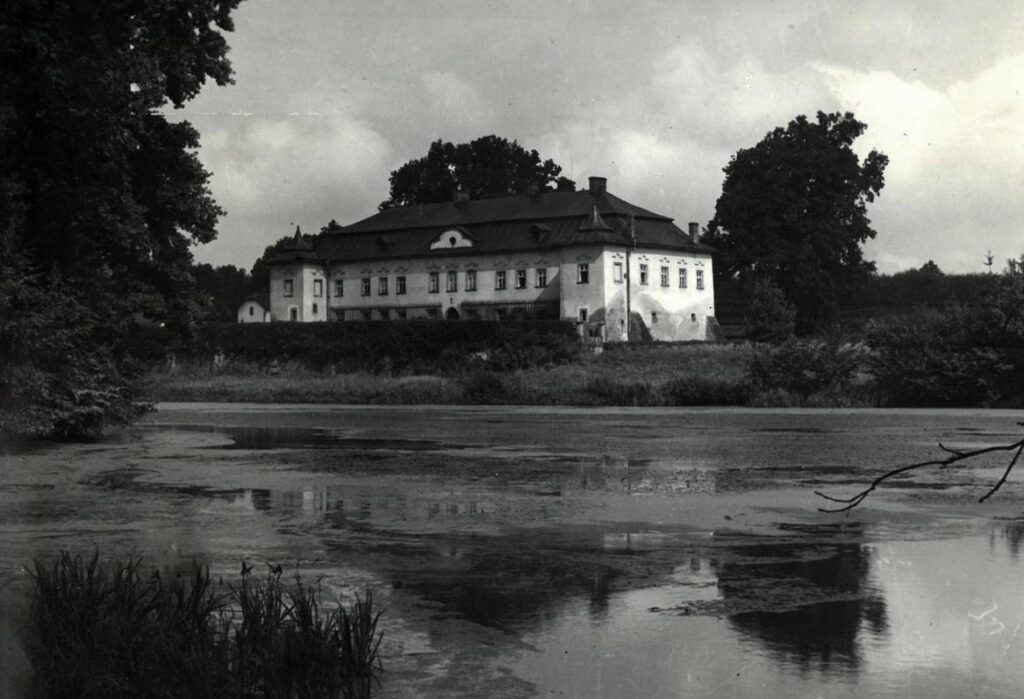
Palace in Głębowice from the southeast with the castle pond, 1939.
World War II
At the outbreak of World War II, Józef Stanisław, not yet mobilized, reported to the Corps District Command in Kraków. Following the military authorities' orders, he traveled through Kielce and Lublin to Rawa Ruska. There, upon learning of the Soviet troops' entry into Poland, he crossed the Romanian border and traveled through Italy to France, where he was assigned to the 1st Field Artillery Regiment. After training at Coëtquidan, he became the supply column commander of the 3rd Division.
During the May 3rd parade in Colombey-les-Belles Martigny, he served as the aide-de-camp to Supreme Commander General Władysław Sikorski. He fought in the 1st Grenadier Division under the command of General Bronisław Duch in the Lunéville area.

Field Mass before the parade of the 1st Grenadier Division on May 3, 1940. From left: President of the Republic of Poland Władysław Raczkiewicz and Supreme Commander General Władysław Sikorski, behind whom stands Józef Stanisław Dunin.

Parade of the 1st Grenadier Division. In front of the grandstand from the left: Captain Józef Stanisław Dunin, aide-de-camp to the Supreme Commander, Major Jerzy Dunin-Borkowski, and others. On the grandstand: including French Ambassador L. Noel, British Ambassador H.W. Kennard, General Sikorski, President W. Raczkiewicz.

Officers of the 1st Light Artillery Regiment, part of the 1st Grenadier Division. Second from the left, Captain Józef Stanisław Dunin.
After the surrender of France, Józef Stanisław was captured by the Germans near Saint-Dié. He was imprisoned in a camp in Mainz (Moguncja), then in Itzehoe, Sandbostel, a punishment camp in Lübeck, and spent the last two years of the war in the officers' prisoner-of-war camp Oflag II C in Woldenberg (Dobiegniewo).
In 1948 in London, he was awarded the Silver Cross of Merit with Swords and in 1947 the Army Medal. In 1949 in Paris, he was decorated with the Croix de Guerre with a Bronze Star, Order No. 2128/C for his participation in the French campaign.

Józef Stanisław in the Itzehoe camp, Oflag XA.

A miniature with the portrait of Józef Stanisław made by Puchalski in the Woldeberg camp in 1943.
Post-war period
In February 1945, with nothing to his name, no possessions, credentials, or even photographs, he returned to Głębowice, where he found the palace looted by Germans, damaged by the Red Army units, and confiscated by the Polish communist authorities as part of agrarian reform. Introduced by the July Manifesto in 1944, the agrarian reform not only deprived former owners of their lands, houses, livestock, and most of their movable property like furniture, libraries, artworks, etc., without compensation but also prohibited them from residing in the county where their estate was located.
Józef Stanisław decided to move to Kraków, where life turned out to be quite difficult due to not having anything except a backpack brought from the camp and the inability to find any work.
In 1947, the Directorate of Waterways in Kraków employed him to assess the areas designated for a reservoir along the upper Vistula near Goczałkowice. From 1950 onward, he worked as a court expert for agricultural matters and property valuation. In 1948, he completed the Tour Guides Course for Kraków and its Surroundings, enabling him to work for the PTTK (Polish Tourist and Sightseeing Society). However, two years later, political authorities had him removed from the list of guides as a suspect element. When he went to the City Committee of the PZPR (Polish United Workers' Party) demanding precise charges, it turned out that his profession listed as a farmer in a personal survey was deemed misleading by the authorities at the time. To counter the accusation, he presented his French identification card, which also listed him as a farmer, and there was no reason for him to conceal anything there. Eventually, he obtained permission to continue working as a guide, a role he carried out with dedication until the end of his life. He was one of the co-founders of the Kraków Circle of City Guides, authoring numerous internal regulations and being an active figure in the field of tourism.
Józef Stanisław, always highly active and holding various social roles, has a rich history of service in civil society.
In Głębowice, he served as the president of the Stefczyk Credit Union, president of the Agricultural Circle, president of the Volunteer Fire Brigade, municipal and then commune councilor, and was a member of the Church Committee, founder of the Dairy Cooperative, and commune councilor in Wieprz.
In Wadowice, he held roles such as president of the District Agricultural Society, director of the Agricultural and Commercial Company, president of the Sick Fund Council, and was a member of the District and County Board, School Commission, Agricultural Commission, Income Tax Commission, and Land Classification Commission.
In Kraków, he served as vice president of the Landowners' Association for Western Małopolska ( Lesser Poland), delegate of the Landowners' Association for collective agreements in Western Małopolska (Lesser Poland), delegate to the National Council of the Landowners' Association in Warsaw, delegate of the Florianka Mutual Insurance Society, and was a member of the Supervisory Board of the Agricultural Syndicate and the Supervisory Board of the Land Credit Society in Lviv.
He also held positions such as vice president of the PTTK District, chair of the Audit Committee of the PTTK Guides Circle, vice chair of the PTTK Guide Committee at the Provincial Management, and was a social guardian for PTTK Monuments Protection. He was a member of the Guides Circle Board, the Audit Committee of the PTTK Branch, the Rules Committee of the City Guides Circle, the Nature Protection Guard at the PTTK Branch, and from 1947, a member of the Judicial College of the Provincial Hunting Court, as well as an examiner for the Hunting Selection Union from 1951 and a member of the Hunting Trophy Valuation Committee.
For his dedication and actions, he received awards such as the Golden PTTK Badge (1965), Silver for Social Work for the City of Krakow (1967), Millennium for Social Activities (1969), Golden for Social Work for the City of Krakow (1973), Silver from the Polish Equestrian Association, as well as numerous diplomas of recognition for his guiding work and social activities in the PTTK Guides Circle in Kraków.
Józef Stanisław Dunin passed away in Kraków on March 16, 1980, and was buried at the Salwator Cemetery in the family tomb of the Dąmbski family from Lubraniec.
Amelia of the Dąmbski family Dunin - wife of Józef Stanisław
Amelia Dunin (1928-2021) worked at PTTK since the post-war period. She was the oldest Kraków guide with an uninterrupted career spanning 70 years. At the age of 92, she still guided French tourists around Kraków. She was a member of the Society of History and Monuments Enthusiasts of Krakow, and since 1990, a member of the board of the Polish Landowners' Society Krakow Branch. Preserving traditions and promoting knowledge about Polish landownership was her duty. Throughout her life, she was an active social worker and philanthropist, collaborating, among others, with Blessed Hanna Chrzanowska in caring for the sick.
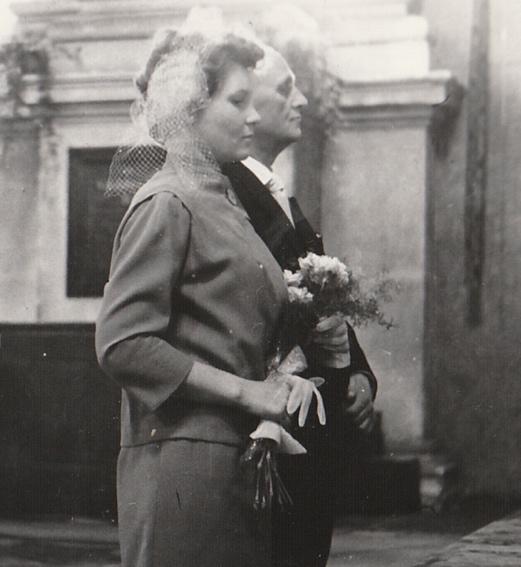
The marriage of Józef Stanisław Dunin to Amelia Dąmbska, Kraków 1961.
In 2016, Amelia Dunin was awarded the Golden Honorary Badge of Małopolska (Lesser Poland) Voivodeship – Małopolska (Lesser Poland) Cross for her contributions to tourism development. In 2018, IPN (Institute of National Remembrance), awarded her the title of Witness of History, and in 2020, she became the first guide to receive the Klemens Bąkowski Award, granted by the Society of History and Monuments Enthusiasts of Krakow for her contributions to scholarly work and activities for Krakow's benefit.
Amelia Dunin passed away on March 12, 2021. Two years before her death, she published Glimpses and Letters, memories of her late husband, under the title Glimpses of My Life. Memories of the owner of the Głębowice Estate (Migawki z mojego życia. Wspomnienia właściciela dóbr głębowickich).
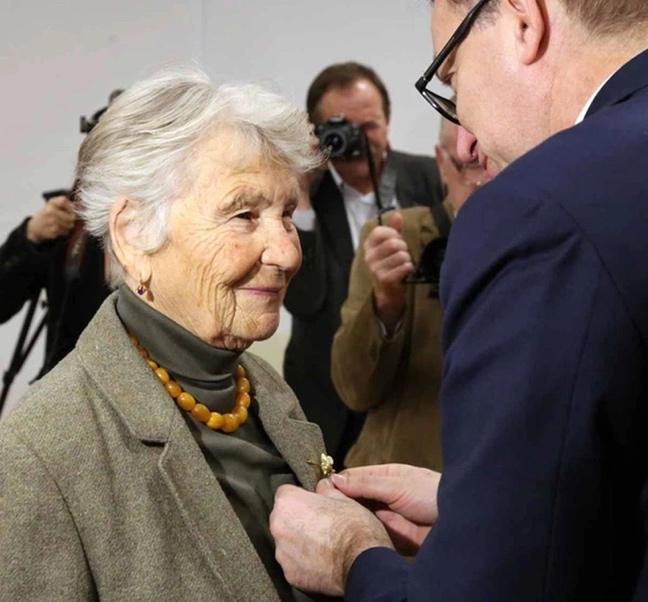
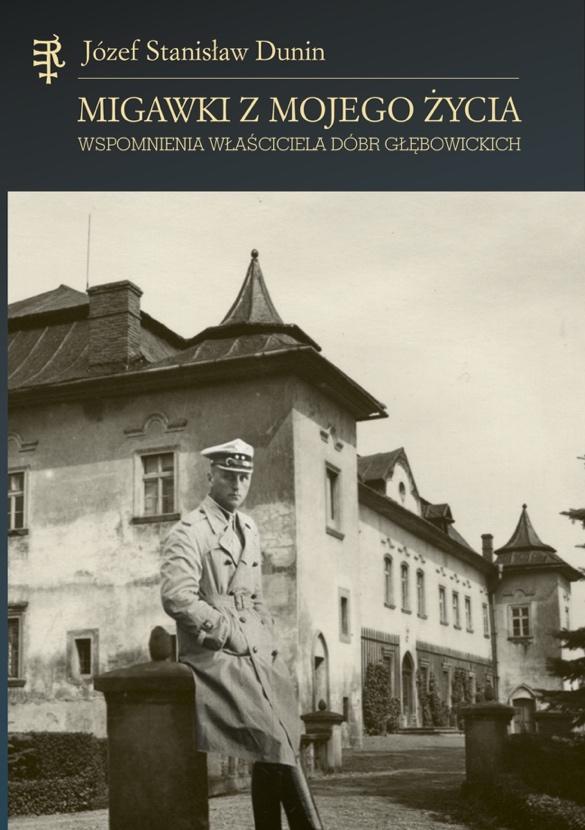

The obituary notice of the late Amelia Dunin prepared by the Society of History and Monuments Enthusiasts of Krakow.
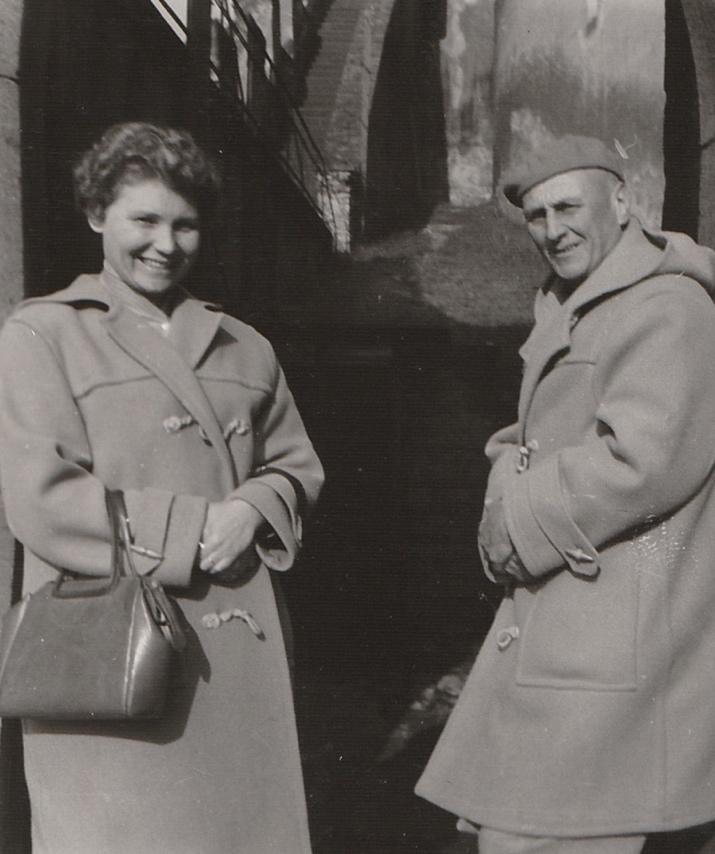
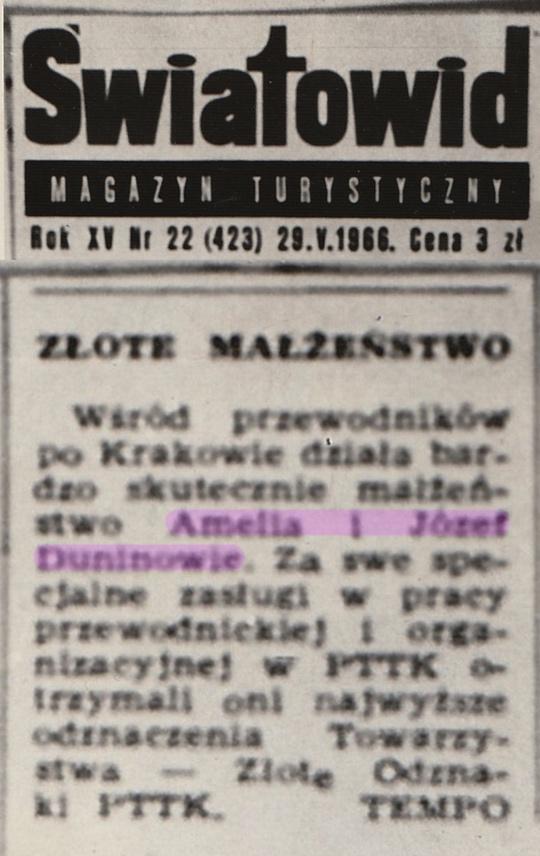
Józef Stanisław Dunin with his wife Amelia - the so-called Golden Marriage of PTTK
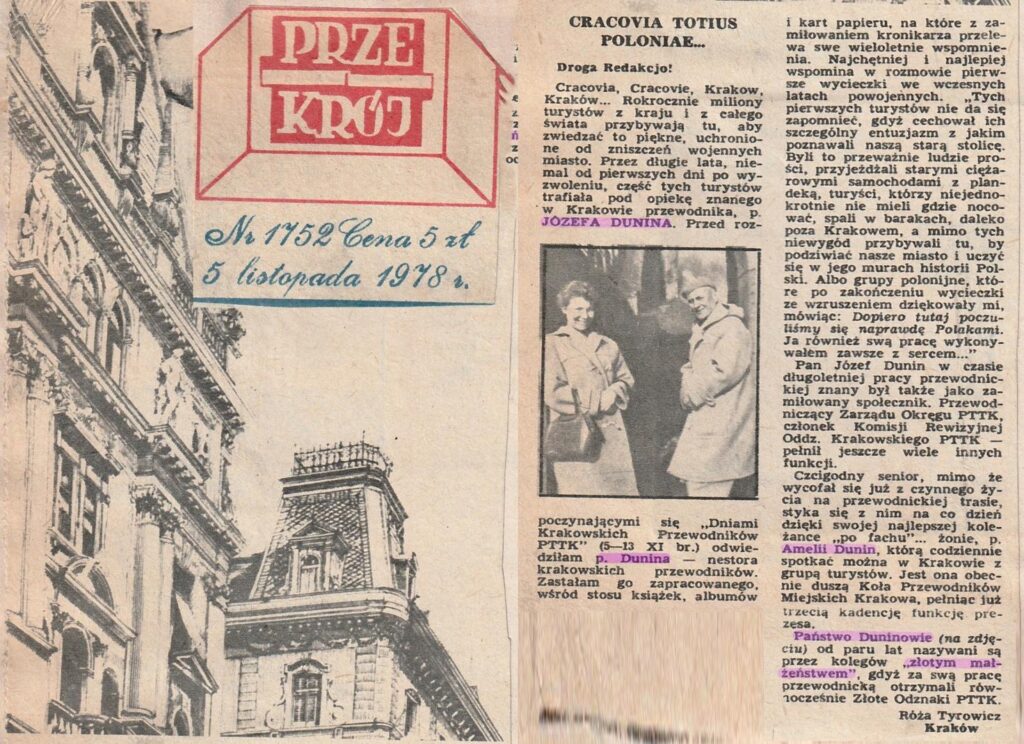
Golden Marriage of PTTK, PrzeKrój No. 1752, November 5, 1978.
PIOTR JÓZEF WŁAST DUNIN OF SKRZYNNO - son of Józef Stanisław
In 1946, Józef Stanisław had his only son, Piotr Józef Włast, with Wiktoria of the Sporysz family.
In 1977, Piotr Józef Włast married Danuta Anna Maria of the Nielubowicz-Tukalski family, bearing Kościesza coat of arms. They became parents to two children: Piotr Włast in 1978 and Barbara Anna in 1983.
Piotr Włast has two sons with Zofia Maria Komornicka of the Nałęcz coat of arms: Stanisław Piotr, born in 2009, and Jerzy Piotr, born in 2012.
Piotr Józef Włast passed away after struggling with a serious illness in June 2020 at the apartment at św. Marka street in Kraków.
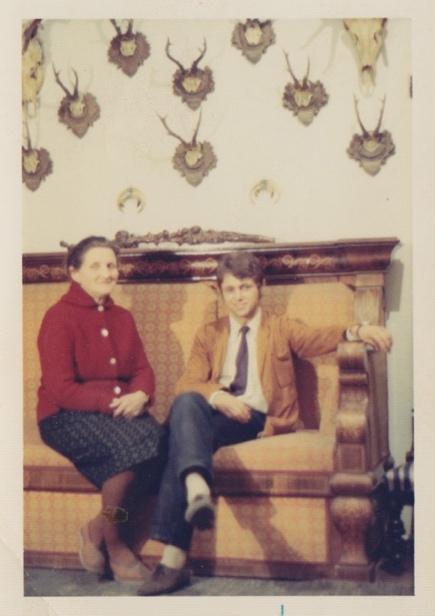
Piotr Józef Włast and his mother, Wiktoria, in an apartment on Rynek Dębnicki in Kraków. They sit on a biedermeier sofa, originally from the red salon of the Głębowice palace, one of the few pieces of furniture miraculously saved during the war.
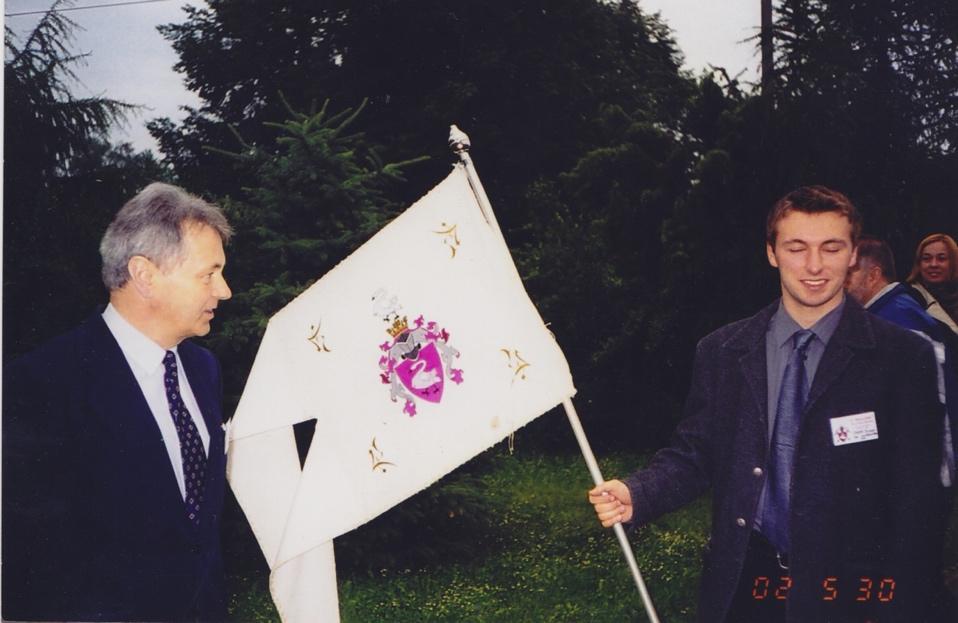
Piotr Józef Włast with his son Piotr Włast during the Dunin family reunion in 2002.
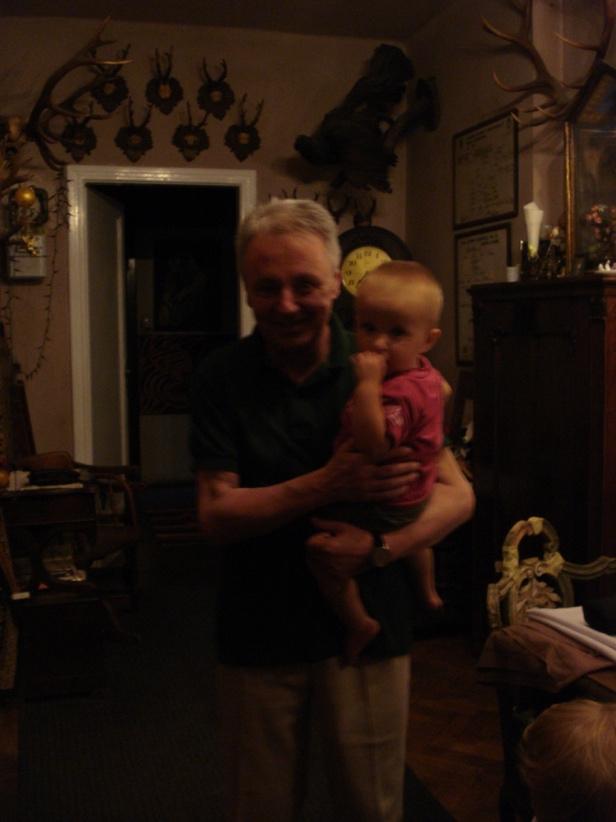
Piotr Józef Włast with his grandson Stanisław Piotr in 2010, in an apartment at św. Marka street in Kraków.
